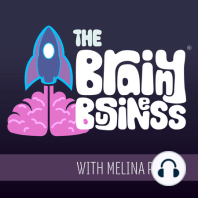50 min listen

73. Starbucks: A Behavioral Economics Analysis
FromThe Brainy Business | Understanding the Psychology of Why People Buy | Behavioral Economics
73. Starbucks: A Behavioral Economics Analysis
FromThe Brainy Business | Understanding the Psychology of Why People Buy | Behavioral Economics
ratings:
Length:
36 minutes
Released:
Nov 8, 2019
Format:
Podcast episode
Description
Six months ago, I did my behavioral economics analysis of Costco, which has zoomed into the 11th most downloaded episode of this podcast. My analysis of Apple Card is right above it, so we can say they share the 10th spot. Today, I’m doing another behavioral analysis of a business: Starbucks. It’s not a coincidence that we are getting into Starbucks right around the holiday season. They have definitely done some things very right when it comes to the holidays…and I will touch on the controversy they’ve seen as well. In the episode we will talk about featured drinks, red cups, nostalgia, pricing strategy, scarcity…and a whole lot more. If you’ve been listening for a while, you know I love Starbucks. Not just for their chai tea lattes and marshmallow dream bars, or because I live in Seattle…but because of the amazing things they have done as a company to shape the world we live in today. Starbucks is a dynamic and large company with a plethora of examples I could have chosen to talk about today. There isn’t time for everything. Instead, I have picked some of my favorite pieces for the episode – ones I think you will find valuable and interesting and be able to apply to your own business (whatever that may be). Whether you work for a global business like Starbucks, are a solopreneur or an academic or somewhere in between…you can learn from the smart things the company has done and how they have understood human behavior. In the episode, we will dig into their star rewards program, as well as featured drinks and products – from PSL to the Unicorn Frappuccino, as well as the coveted red cups (which just launched a couple days ago by the time this comes out), the personality and overall brand choices in their logo, locations and on social media and, of course, pricing. Show Notes: [04:31] Without the original brand and pricing, Starbucks would be just another coffee shop. [05:04] It really is an amazing feat when you think about the commoditized industry Starbucks was facing before it launched its first store. [06:04] One of the big aspects Starbucks had to overcome was the pricing anchor. The first number you hear (or a standard price) is the anchor, and the brain adjusts from that to determine what is reasonable. [07:02] The way we act is driven by our subconscious, and when you ask a logical question to the conscious, it doesn’t answer in a way that reflects true behavior. [07:19] To justify a higher price, Starbucks needed to invent a new category. [07:59] This wasn’t just about coffee – it was creating community…a “third place” – an experience that was something more. [08:21] Functional fixedness: when all you have is a hammer, everything looks like a nail. [08:48] When you look at what everyone else is doing, herding will keep you stuck. [09:01] Howard Schultz and Starbucks took a step back, got out of their own way, and created a new category which changed the conversation about coffee. [09:12] Asking good questions can help you get there. [10:01] Ask questions that aren’t about what everyone else is doing. Don't get stuck in the herding or the anchors. Instead, it is about looking to what could be, and asking “How might we?” or “Why?” [10:07] For your business, look at all the things you do because everyone else does. Is that serving you well? What would make your customers excited? Delighted? [10:29] Price is never about price. It's about all the things that come to for the price. Starbucks is a fantastic example of that. [10:56] Studies about wine show that people get more enjoyment from drinking wine that is more expensive. [11:37] When you can break free from the herd and make it about something more, your business can reap benefits beyond what you even imagine. [12:13] Starbucks changed the game with all of their drink options. The first drink they made famous was the Frappuccino. [13:38] The brain gets what it expects. If you expect Frappuccinos to be delicious and you get something similar by a different name, it
Released:
Nov 8, 2019
Format:
Podcast episode
Titles in the series (100)
21. Habits: 95% Of Decisions Are Habitual - Which Side Is Your Business On?: Habits are much more powerful than most of us realize. This behavioral economics podcast is about habits and habitual buying. It is another one of my behavioral economics foundations podcasts. When a lot of us think of habits, we focus on bad habits,... by The Brainy Business | Understanding the Psychology of Why People Buy | Behavioral Economics